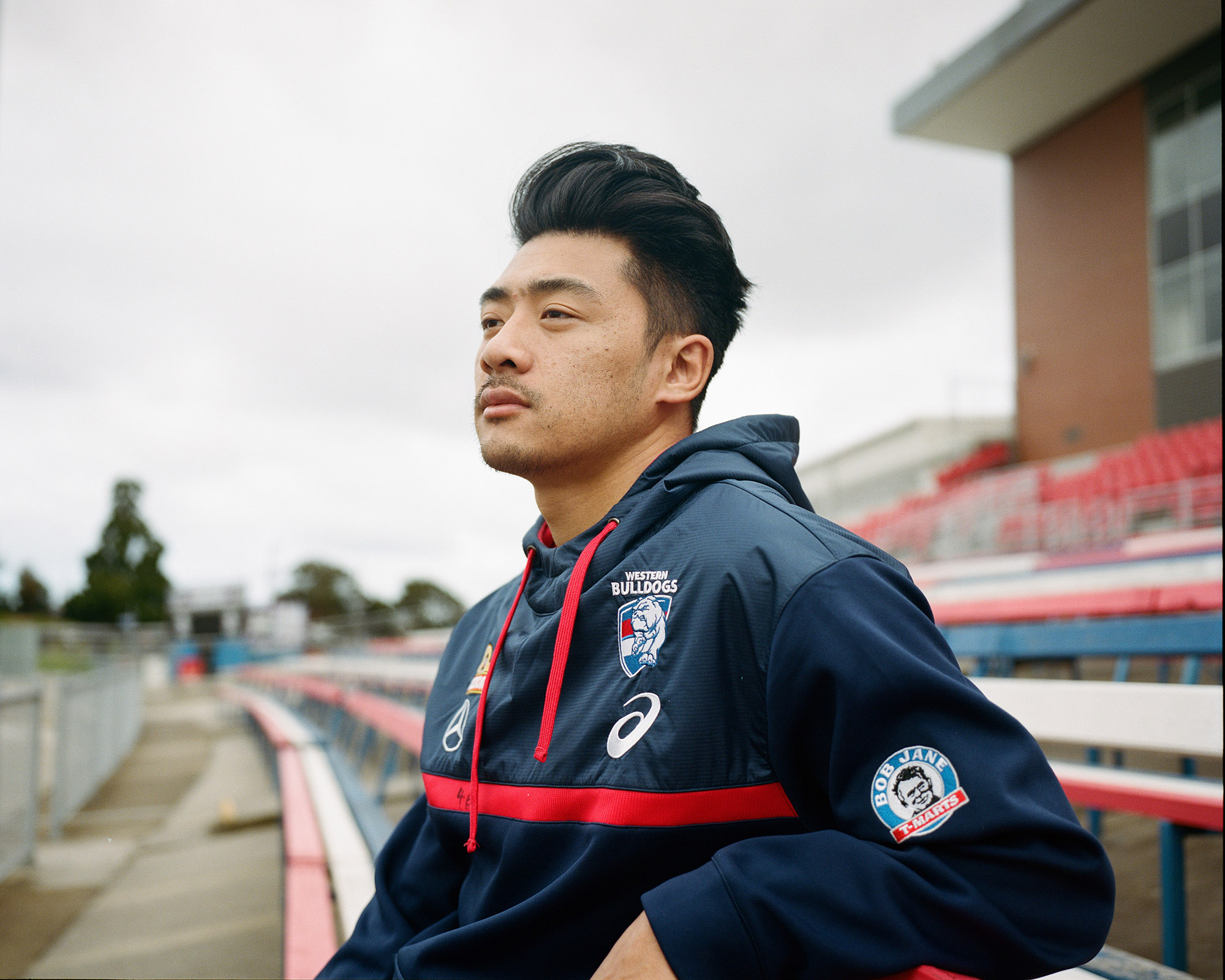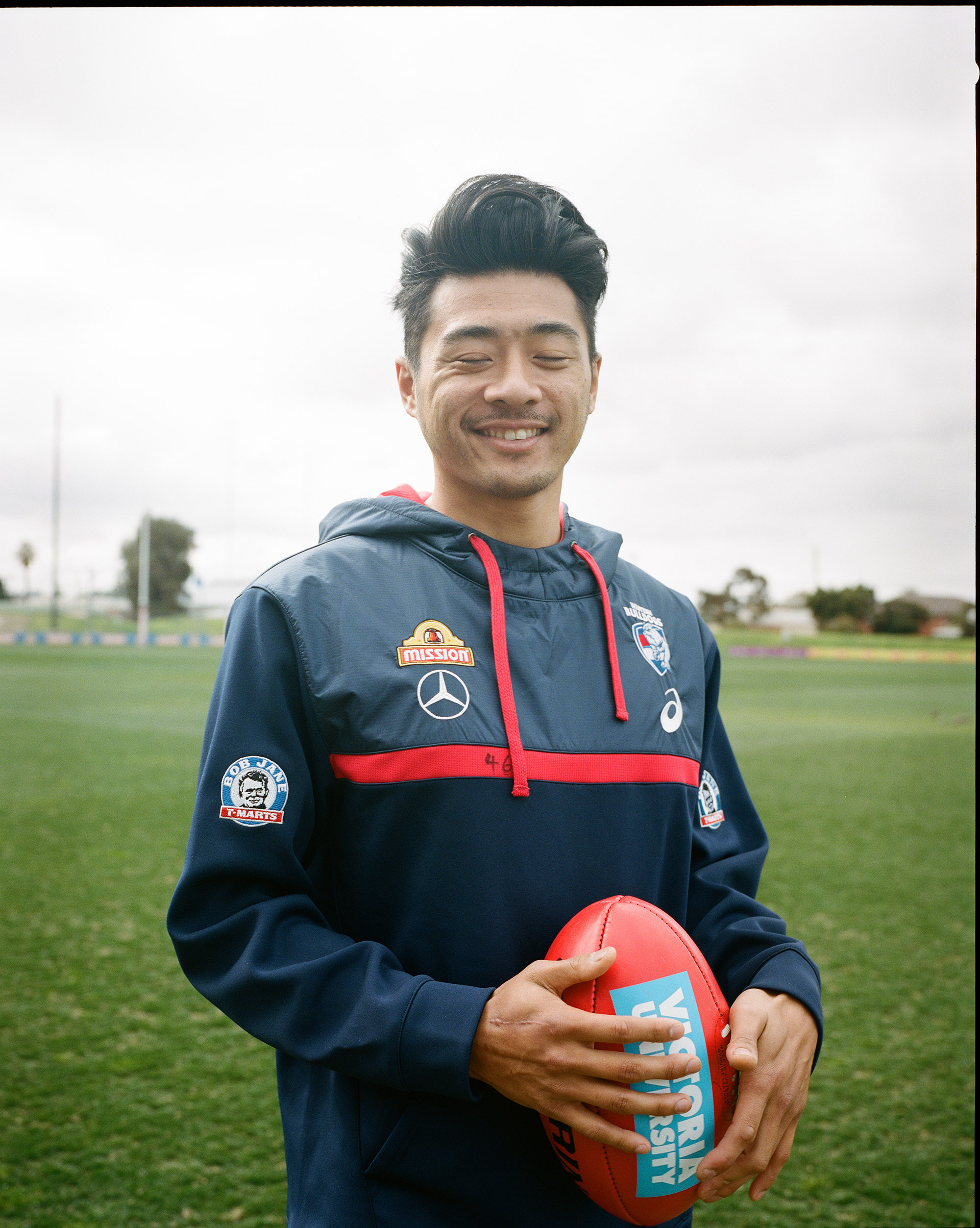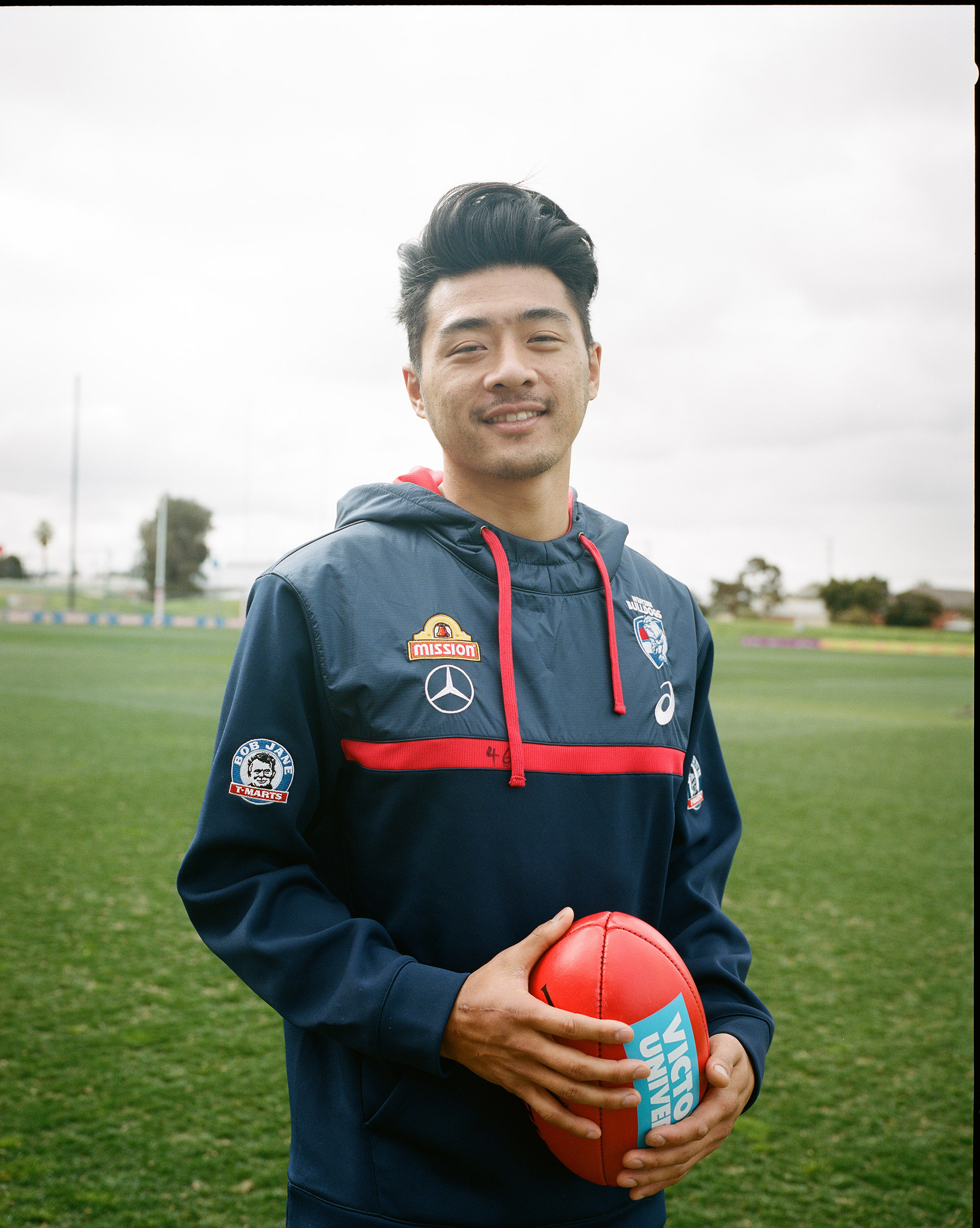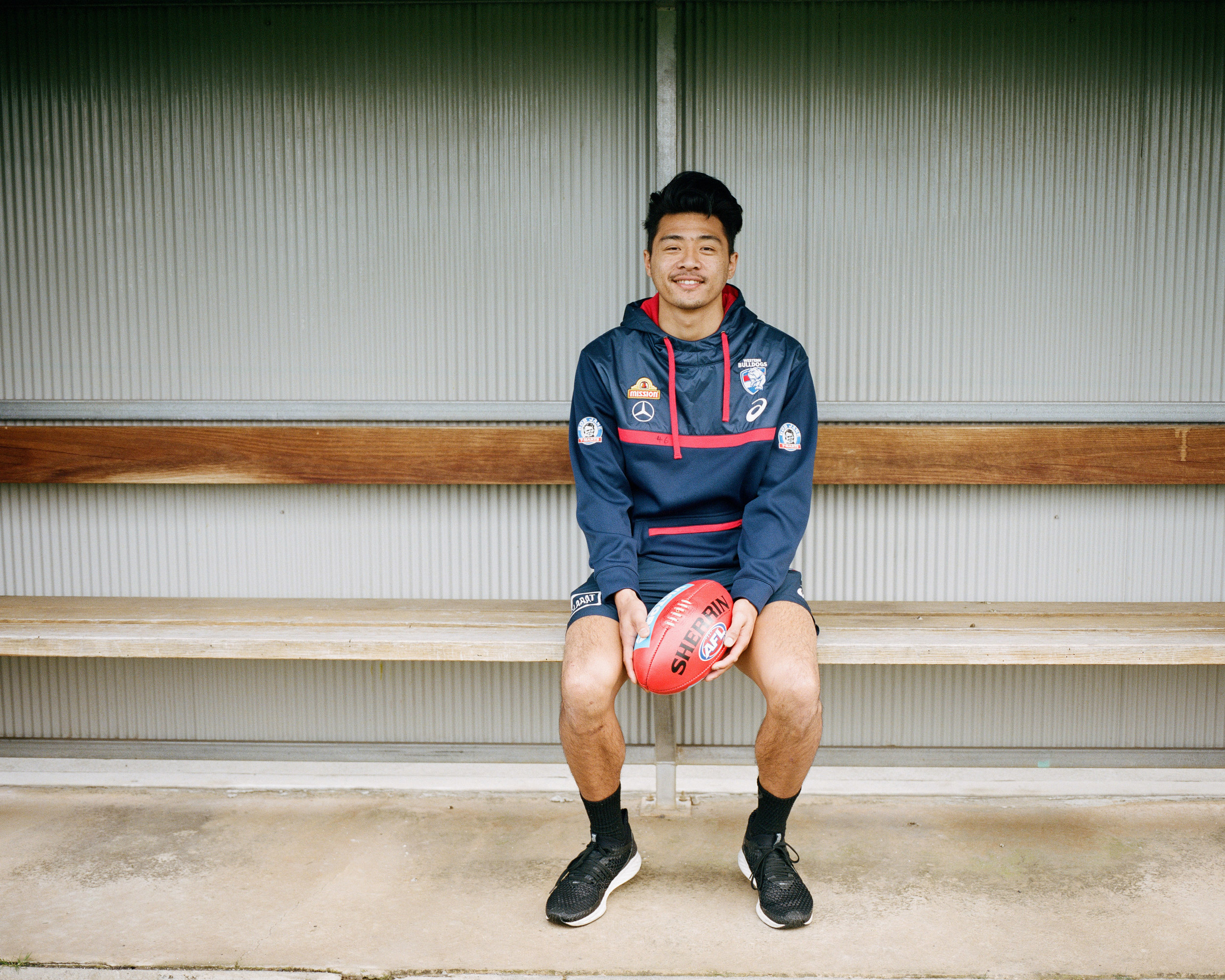Interview #183 — Lin Jong
By Robert Wood
Lin Jong is an Australian Rules football player with the Western Bulldogs. Of East Timorese and Taiwanese heritage, he has played professionally since 2012.
Jong has played in two VFL Premiership winning sides, and was the Norm Goss Memorial Medal Winner in 2016. He famously won that medal with a best-on ground performance despite a cracked collarbone.
This interview was first published as part of Liminal’s first print edition, in 2019.
Tell us about sport in your early life: what did you start out playing and why?
In my early life, sport was pretty non-existent. I suppose growing up in an Asian-Australian family, sport is not a big thing. I always played in school, and I started playing basketball when I was about 12, which transitioned into football when I was about 15. My dad was really supportive of me playing sports, whereas mum thought it was a bit of a waste of time, and wanted me to focus on studying and whatnot. That was my early exposure to it.
I do remember reading an article where you were saying that your mum’s your #2 fan but your dad is your #1 fan.
Yeah, Mum tries to claim #1—but Dad’s been there from the start! So I’ll give him #1.
It sounded like he always thought football was a good thing for you to be involved in. What was appealing about footy for you? And how did you get involved with a team?
It was my friends who persuaded me to join the local team. There was a bit of hesitation from me, because these days when kids grow up wanting to play sports they can see themselves in players, you know? A kid can look at a local football player, and say, “I’m like him, I can grow up to be like him.” But I never felt like I had that role model in football. So there was hesitation in joining the football club, knowing that I would be the only Asian player out there. But I joined the team with my friends, which made the transition a lot easier.
I guess in that way, there have been a lot of great Asian-Australian footy players: George Tan-Sing, Danny Seow, Peter Bell, and others…and this is to say nothing of people coming from everywhere to play footy. I think the AFL has gotten better in terms of race issues, but there’s still room for improvement. Can you talk about multiculturalism in the league, and how you’ve experienced multiculturalism since you’ve started playing professionally?
Yeah, I definitely feel like it’s grown so much since when I used to watch football. I’m not sure what the statistics are, but I’m sure there’s a large amount of players now who have parents who are born overseas, or were born overseas themselves. These days, it’s not hard to find all these different players from different countries and cultural backgrounds. I feel like it’s only going to get bigger and bigger, better and better.
Definitely. I remember reading that when you started playing you got a letter from Xanana Gusmao, who is the first President from East Timor, which is where your father is from. I think it’s an amazing achievement. He’s such an important political leader and on the world stage. Can you talk about your heritage and what family means to you in terms of your footballing identity?
That was obviously a massive surprise, that letter. With my family, and I don’t want to talk them up because everyone would say the same about their family, about how you’re not who you are without them. But everything I’ve achieved and the way I am now and my values— these things come from my family. As clichéd as it sounds, my family means everything to me.
But I never felt like I had that role model in football. So there was hesitation in joining the football club, knowing that I would be the only Asian player out there.
I mean in that way, your father as your #1 fan and having that connection to East Timor is really important. Now, you just said that the letter from Xanana Gusmao was a bit of a surprise, but was it a surprise for you when you ended up playing for the Western Bulldogs? What was it like to become an AFL player after you were drafted in 2012?
It was definitely a surprise. Growing up, I never really dreamt of playing AFL football; it wasn’t a goal of mine. But when I played in the juniors league, things got a bit more serious. And then I did a few interviews with clubs… I didn’t think the Bulldogs were going to pick me but they eventually did, and as I said, it was a big surprise.
It is a great surprise, I imagine, and there’s a lot of history at the club, with heaps of former champions and great players, from Ted Whitten to Bob Murphy. What was it like to play with some champions?
I guess when I first went there…I never knew much about the Bulldogs. But there were a few players whom I’d met, like Matt Boyd and Bob Murphy, who you’d just be a bit in awe of, knowing they’re your teammates now. And I learnt the hard way that there was a long road ahead of me and I had a lot of work to do to make an impact at the AFL level.
You came into the team at quite an exciting time, with a wonderful coach and good management. What was it like when you pulled on a jersey and ran out against Richmond for your first game at the MCG? Can you remember that day?
That whole week was a bit of a blur I really had no idea I was going to be playing or even having a chance to play. The coach called me and said, “Yeah, you’ll be playing this week.” so I had a lot of friends and family come along. To make my debut at the MCG was really special. It honestly felt like it was a dream.
You’ve had a number of career highlights and of course, some disappointments. I think both of these happened in the 2016 season. Tell us about 2016: the finals for the club, the staff, the feeling there, the whole experience.
It was obviously as good as it gets, I suppose, for us, that year when we won the premiership, everything was going well. That whole series was really amazing, some of the best footy we’ve ever played. I’m not sure how to describe it, but just—everything was flowing, everything just clicked, everyone was just on the same page, I think.
In terms of the present, how has this season been for you? It’s coming up to 7 years since you started playing—what have you learnt since you started? And where you’re at now; what do you tell the young guys who’ve just been drafted?
Obviously this year hasn’t gone too well for us, with more losses than we’d like. The last month, August, we’ve been playing better football. I broke my collarbone this year, my form’s gone up and down... it hasn’t been the greatest year. Now that I’m getting a bit older, I always try to make a bit of an effort with the young guys, especially the first years, because I still remember how hard and scary and intimidating it was when you first start off, making sure that you make them welcome, always trying to have a chat with them. That’s kind of what I try to do.
What about football at the moment? Do you have an opinion about the rules changes, or the flow of the game, or how footy has changed in the last decade?
Yeah, I’ve honestly haven’t been too opinionated on that. I know the game is so much quicker than it used to be, but I don’t know. As players you just kind of go out there and play, and you adjust to the rules. I think overall you wouldn’t want too many more changes but yeah—to be honest I don’t really take too much notice of it all.
Growing up, I never really dreamt of playing AFL football; it wasn’t a goal of mine.
The game is one part of it, but so too is thinking about sport as a way to bring people together and the importance of your club in the community. Can you explain where the club stands in the community, and what you’ve learnt from being there as a citizen?
Yeah. The Bulldogs really see ourselves as a community club; we run a lot of programs to help out the community, especially with immigrants who have just moved to Australia, to welcome them through some of the programs we run. It makes you feel really proud to be part of a club that wants to do so much for the community. It’s two-fold because I’m sure they’re appreciative of the club helping them out as well—it’s always good to have some extra fans.
I think that’s a really important function of sport in Australia in a general way, not only professional stuff but at the grassroots level—I’ve got a couple of friends who play in the A-league and they just talk about the value of connecting with people, but also visiting a hospital or talking with migrant communities and supporting them. So I think people can learn a lot from how sports players are in the community.
Definitely. It’s still pretty hard to understand how much of an impact you can have. Sometimes it feels like you’re just doing something here or there but it might impact someone significantly, or in some way or another, and if that’s a way we can help out then we’re more than happy to do that.
Did you kind of get a sense of that community ethos, growing up in your family? You’ve talked about your dad a bit, how he was a really good example, how he went and did things; were they important parts in the East Timorese and the Taiwanese community in terms of supporting each other, too?
I know that my mum and dad, especially when I was younger, would always support the East Timorese community and the Taiwanese community, so I know that for them it was a big way to stay connected, and to still embrace our own cultures as much as the Australian culture.
I think that’s one of the functions of sport as a community. I’ve got one more question for you: what does the future hold for you? I also have an Asian mum—what does your mum reckon you should do after footy?
Growing up, mum wanted me to be a doctor—it’s a shame I wasn’t that smart! [laughs] I study part-time at uni at the moment. I’m studying to be a teacher. Hopefully it all pans out well and I’ll be doing that. I’ve always looked forward to doing that, because I never knew if I was going to play footy or not. You know, something I’m looking forward to in life after footy.
Growing up, mum wanted me to be a doctor—it’s a shame I wasn’t that smart!
Do you have any advice for emerging athletes?
I suppose my advice would be to just make sure you’re enjoying what you’re doing. And make sure you know why you started playing, and to make sure you’re still enjoying itI think that would be the number one thing.
Who are you inspired by?
My parents have been a big influence on me, especially my dad. I think now that I’m a bit older, I have a much bigger appreciation of how many sacrifices they made for me, so I suppose in a way how he goes about his life: that inspires me.
How do you practice self-care?
In terms of self-care there’s plenty of support, especially as a football club—we’ve got psychologists and things like that. But I actually I have an app on my phone called Calm, which is kind of one of the few different meditation things that I use? So that would be my main source of self-care. My partner listens to a lot of Buddhist podcasts, which she shows me every now and then.
What does being Asian-Australian mean to you?
I guess for me it’s embracing Australian culture but at the same time still remembering who you are—and kind of forming your own identity in a way. Not conforming to anything you don’t want to. I suppose like me, playing football was sort of a way in to that Australian culture, but still always being proud of my background, especially of where my parents are from.
I suppose like me, playing football was sort of a way in to that Australian culture, but still always being proud of my background, especially of where my parents are from.
Find out more
Interview by Robert Wood
Photographs by Anne Moffat






